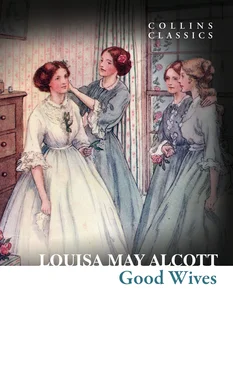GOOD WIVES
Louisa May Alcott

William Collins
An imprint of HarperCollins Publishers
1 London Bridge Street
London SE1 9GF
WilliamCollinsBooks.com
This eBook edition published by William Collins in 2016.
Life & Times section © HarperCollins Publishers Ltd
Gerard Cheshire asserts his moral right as author of the Life & Times section
Classic Literature: Words and Phrases adapted from Collins English Dictionary
Cover by e-Digital Design
Cover image: Meg prepares for her wedding to John Brooke, in the gown she has made herself , M. V. Wheelhouse, 1911 © Mary Evans Picture Library
A catalogue record for this book is available from the British Library.
All rights reserved under International and Pan-American Copyright Conventions. By payment of the required fees, you have been granted the non-exclusive, non-transferable right to access and read the text of this e-book on-screen. No part of this text may be reproduced, transmitted, down-loaded, decompiled, reverse engineered, or stored in or introduced into any information storage and retrieval system, in any form or by any means, whether electronic or mechanical, now known or hereinafter invented, without the express written permission of HarperCollins.
Source ISBN: 9780008166731
Ebook Edition © January 2016 ISBN: 9780008166748
Version: 2015-12-04
In 1819, millworker William Collins from Glasgow, Scotland, set up a company for printing and publishing pamphlets, sermons, hymn books, and prayer books. That company was Collins and was to mark the birth of HarperCollins Publishers as we know it today. The long tradition of Collins dictionary publishing can be traced back to the first dictionary William published in 1824, Greek and English Lexicon . Indeed, from 1840 onwards, he began to produce illustrated dictionaries and even obtained a licence to print and publish the Bible.
Soon after, William published the first Collins novel, Ready Reckoner ; however, it was the time of the Long Depression, where harvests were poor, prices were high, potato crops had failed, and violence was erupting in Europe. As a result, many factories across the country were forced to close down and William chose to retire in 1846, partly due to the hardships he was facing.
Aged 30, William’s son, William II, took over the business. A keen humanitarian with a warm heart and a generous spirit, William II was truly ‘Victorian’ in his outlook. He introduced new, up-to-date steam presses and published affordable editions of Shakespeare’s works and The Pilgrim’s Progress , making them available to the masses for the first time. A new demand for educational books meant that success came with the publication of travel books, scientific books, encyclopedias, and dictionaries. This demand to be educated led to the later publication of atlases, and Collins also held the monopoly on scripture writing at the time.
In the 1860s Collins began to expand and diversify and the idea of ‘books for the millions’ was developed. Affordable editions of classical literature were published, and in 1903 Collins introduced 10 titles in their Collins Handy Illustrated Pocket Novels. These proved so popular that a few years later this had increased to an output of 50 volumes, selling nearly half a million in their year of publication. In the same year, The Everyman’s Library was also instituted, with the idea of publishing an affordable library of the most important classical works, biographies, religious and philosophical treatments, plays, poems, travel, and adventure. This series eclipsed all competition at the time, and the introduction of paperback books in the 1950s helped to open that market and marked a high point in the industry.
HarperCollins is and has always been a champion of the classics, and the current Collins Classics series follows in this tradition – publishing classical literature that is affordable and available to all. Beautifully packaged, highly collectible, and intended to be reread and enjoyed at every opportunity.
Life & Times
About the Author
Louisa May Alcott was born into a family of American transcendentalists, the second of four daughters. Transcendentalism was essentially a movement initiated in reaction to a feeling that society was eroding its mores and was consequently in need of reform. Alcott was therefore immersed in an environment of progressive thinking and intellectualization during her formative years. This included a strong moral objection to the notion of slavery, which would become the lynchpin of the American Civil War (1861–5). The Alcotts hid a runaway slave in their house in 1847, such was their commitment to the cause.
During the war itself Alcott worked as a nurse and it was her experiences that served to hone her story-telling skill. It wasn’t until early middle age, however, that she became a success. In 1868 the first part of Little Women was published to great acclaim and her reputation grew from there. But her life was not a long one, and she died of ill health at the age of 55 in 1888.
Apart from the Little Women trilogy, she wrote many other novels and children’s stories, which are better known in the United States. Her writing style remained more or less similar to Little Women , because she was primarily interested in the comings and goings of people in her stories. They are the forerunner of the cast novels written by modern-day writers such as Maeve Binchy, where the stories are windows into many interrelated lives.
On a socio-political level, Alcott’s legacy is that she is held aloft as an early feminist and humanitarian. Her high intellect rendered her unable to resist the testing of conventions in her real life and in her literary alter-egos. She lived through the turbulence of the American Civil War and saw America metamorphose into a modern nation where slaves were freed of their literal chains and women were freed of their metaphorical chains. It was a dual emancipation and Alcott effectively documented the event in her prose.
Little Women
Published in its entirety in 1880, Little Women is a novel about an American family from a female perspective. Louisa May Alcott based the story on the formative years of herself and her three sisters. It is a novel that says a great deal about people and society without requiring a complex or sweeping plot to carry the reader along.
The primary theme is that siblings each have different personalities despite their having been brought up in the same family environment – nature versus nurture. Alcott gives each of the four sisters particular idiosyncrasies that signature their personalities and generate advantages and disadvantages for them. Thus they are each known for being vain, quick-tempered, coy or selfish. The novel is partly about the extent to which children live up to their ascribed personality traits once they are known for them, or rather are allotted them, as if parents need to compartmentalize their children’s characters.
Alcott was writing at a time when people held deeply Christian values, where the ideal person was the opposite of all of these traits: modest, level-headed, outgoing and giving. The idea was to pretend to be that ideal, albeit unattainable, synthesis. It was all about being virtuous and wholesome in the eyes of the Christian God, and also a good prospect as potential wife or husband material in the eyes of others who held the same views. Thus Alcott generally regards the traits of the March sisters as personality flaws, as opposed to strengths, and the four sisters struggle to overcome them rather than embrace them.
Читать дальше













